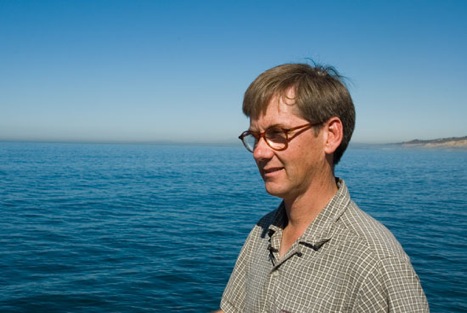
"When I travel with my kids, I tell them they're seeing things I don't expect they'll see again in future because of the climate crisis."
This is what Professor Ralph Keeling— world-renowned climate scientist at the Scripps Institution of Oceanography's CO2 Program— told the San Diego City Council regarding the state of our region's climate. Keeling shared insights from his research and startling statistics about what challenges lie ahead for San Diego.
With atmospheric CO2 levels at the highest Earth has seen in the past 800,000 years, Professor Keeling warned that San Diego will see at least 15 feet of sea level rise. He also predicted more intense heat waves, droughts, wildfires, and impaired air quality— all especially concerning for low-income communities such as Barrio Logan, Sherman Heights, City Heights and National City. Our communities already suffer the health consequences of the region's pollution and lack of resources such as healthcare, air conditioning and transportation, making it more challenging to cope with worsening conditions.
We have already seen climate change disproportionately impact our disadvantaged communities. During the state's heat wave of 2006, 99 percent of the associated deaths occurred in zip codes where more than half of residents were below the poverty line. The California Department of Public Health and the American Public Health Association have identified climate change as one of the most serious public health threats facing our nation, warning that the impacts are occurring sooner than expected.
San Diego can still tackle the great challenges of climate change, and the time to act is... yesterday! We have many solutions within our grasp to reduce pollution and create local jobs at the same time, such as installing solar panelson our rooftops and in our parking lots, making our buildings more energy and water efficient, building better transit and making neighborhoods more walkable and bikeable. The City of San Diego and the Port of San Diego have the opportunity to plan and implement all of these solutions by passing sustainable Climate Action Plans.
Old plans were not aggressive enough to keep up with the pace of climate change, and the Port of San Diego has yet to release a full draft of the plan it's been crafting for nearly three years. Meanwhile, our communities are already experiencing the effects of climate change. San Diegans deserve climate action plans that work, and they deserve them now.
Professor Keeling gave us hope that we still have a window of opportunity to stop the worst of climate change, but he warned that window is quickly closing. Hopefully his research and advice will urge City Council and the Port to take action equally as fast and aggressive as climate change. Stay tuned for more updates on the City and Port of San Diego's Climate Plan progress.

